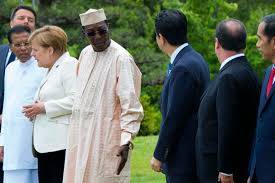ISE-SHIMA - Leaders from the Group of Seven advanced democracies met Friday with representatives of emerging and developing countries in Asia and Africa.
The so-called outreach programme involves Chad, Indonesia, Sri Lanka, Bangladesh, Papua New Guinea, Vietnam and Laos.
G7 host Japan said ahead of the meeting that it would zero in on Asia's stability and prosperity including "open and stable seas" as well as United Nations sustainable development goals, with a focus on Africa.
The reference to maritime issues comes as tensions build over Beijing's claims to almost the entire South China Sea, a strategic body of water that encompasses key global shipping lanes. China's maritime claims and ongoing militarisation of islets and outcrops have angered some of its Southeast Asian neighbours, including the Philippines and Vietnam.
At the close of their formal session in Ise-Shima, G7 leaders fired a broadside across China's bows over its behaviour in the region, without mentioning Beijing by name.
"We are concerned about the situation in the East and South China Seas, and emphasise the fundamental importance of peaceful management and settlement of disputes," the summit-ending statement said.
Beijing is also locked in a dispute with G7 host Japan over rocky outcroppings in the East China Sea, stoking broader concerns about Beijing's growing regional might and threats to back up its claims with force, if necessary.
China, for its part is engaged in a furious diplomatic charm offensive among developing countries, offering aid and trade in what critics see as a naked bid to rally international support to its cause.
The roster of countries Beijing claims back its position on the South China Sea includes Mauritania, Togo and land-locked Niger.
Also participating in Friday's sessions were UN Secretary General Ban Ki-moon, International Monetary Fund chief Christine Lagarde and World Bank head Jim Yong Kim.
The heads of the Organisation for Economic Co-operation and Development and the Asian Development Bank also attended.
Meanwhile, the refugee crisis gripping Europe is a problem that the whole world must deal with, G7 leaders said Friday, as it called for beefed-up efforts to tackle the root causes of mass migration.
Last year, some 1.3 million refugees, mostly from conflict-torn Syria and Iraq, asked for asylum in the European Union - more than a third of them in Germany - stretching resources and aggravating popular resentment in some countries.
The mass movement has provided fuel for Europe's far right parties and populist politicians like France's Marine Le Pen, who has called for a clampdown on immigration.
So far this year, the International Organisation for Migration says an estimated 190,000 migrants and refugees have entered Europe by sea, arriving in Italy, Greece, Cyprus and Spain. More than 1,300 are known to have died en route.
"With the number of refugees, asylum seekers, internally displaced persons (IDPs) and vulnerable migrants at its highest level since the Second World War, the G7 recognises the ongoing large scale movements of migrants and refugees as a global challenge which requires a global response," it said in a communique at the end of a two-day summit in Japan.
"We place the highest priority on humanely and effectively managing this challenge, addressing both the humanitarian consequences and the root causes of massive displacement."
The G7 - the United States, Japan, Germany, Britain, France, Italy and Canada - said it would kick in more money to help the problem.
It gave no global figure, but German leader Angela Merkel told reporters the G7 had decided to dedicate its attention this year "especially to Iraq" - one of the chief sources of the tide of migrants fleeing conflict and seeking refuge in Europe - and would provide 3.6 billion euros ($4 billion) to the country.
"We commit to increase global assistance to meet immediate and long-term needs of refugees and other displaced persons as well as their host communities," they said. "The G7 encourages international financial institutions and bilateral donors to bolster their financial and technical assistance."
It added that a resolution to Syria's civil war was crucial to plugging the flow of desperate people fleeing across borders.
"The G7 recalls that only sustainable political settlements within countries of origin, including Syria, will bring lasting solutions to the problem of forced displacement, including refugees," the communique said.
"Large movements of people are a multi-faceted phenomenon, which requires addressing its root causes resulting from conflicts, state fragility and insecurity, demographic, economic and environmental trends as well as natural disasters."
The statement came a day after European Council President Donald Tusk warned that the crisis was not just Europe's problem.
"We are aware that it is because of geography that the most responsibility is, and will continue to be, placed on Europe," Tusk told reporters on the sidelines of the summit in Ise-Shima, 300 kilometres (200 miles) southwest of Tokyo. "However we would also like the global community to show solidarity and recognise that this is a global crisis."






